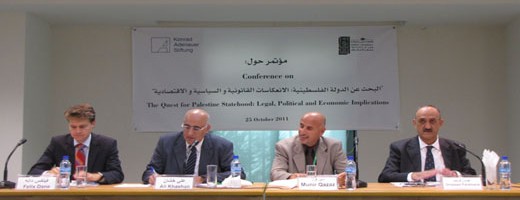The Quest for Palestine Statehood: Legal, Political and Economic Implications
Tuesday, 25 October 2011: In cooperation with the Konrad Adenauer Stiftung (KAS), the Institute of Law (IoL) at Birzeit University hosted a conference on The Quest for Palestine Statehood: Legal, Political and Economic Implications. To explore possible and impossible tactics and processes needed to build and proclaim the State of Palestine, the Conference was held in presence of Dr. Ali Khashan, Palestinian Minister of Justice, Dr. Munir Qazzaz, Birzeit University Vice-President for Community Affairs, Dr. Ghassan Faramand, IoL Director, and Mr. Felix Dane, Head of the KAS Office in the Palestinian Territory.
In his opening remarks, Dr. Faramand outlined that the Conference would address various tools that are supposed to be effective and efficient in materialising and sustaining the state building process. These included inherent tools of international and constitutional law, politics and economy. In particular, the Conference would focus on international law from the following perspectives: (1) the general role of international organisations, as well as the specific role of the UN agencies and international courts, in furnishing support to Palestine statehood recognition; (2) the value and nature of the diplomatic recognition of emerging states (states in statu nascendi) and ensuing gains; and (3) the legal and political foundations supporting Palestine statehood.
Dr. Qazzaz explained that the IoL staff worked relentlessly over the past five months to hold the Conference. To comprehensively cover all primary issues of the Palestine statehood, 12 papers would be presented over three sessions.
“The IoL at Birzeit University seeks to serve as an outstanding, objective think tank. It admits all constructive points of view that assist decision makers and contribute to enrich the Palestinian experience.” Dr. Qazzaz added.
Expressing his immense happiness with the event, Dr. Khashan stated that the Conference would effectively contribute to providing important information needed to realise dimensions and future of the State of Palestine.
“We do not only want a state. We want a democratic state that is built on clear, informed foundations. First and foremost, these include principles enshrined in the body of international laws, particularly International Humanitarian Law as well as human values articulated in religions and international conscience.” Dr. Khashan emphasised.
Mr. Dane stated that the Conference was a fruit of ongoing cooperation and partnership between the IoL at Birzeit University and KAS Office in Ramallah.
“The IoL has a strategic partner with us for an extended period of time. The IoL has remarkably contributed to issues that further consolidated the rule of law, freedom of women and elections. In this Conference, the IoL will provide a distinguished, significant vision of the relationship between law and international relations.” Mr. Dane explained.
Moderated by Dr. Nafe’e Al Hasan and commented on by Dr. Yaser Amouri, the first session of the Conference addressed legal foundations of the Palestine statehood. Dr. John Quigley, Professor of Law at the Ohio State University, made a presentation on the “Legal Foundations of Statehood: The Way Ahead for the Palestinian State”. Ms. Reem al Butmeh explained the “Role of the United Nations in Securing the Palestine Statehood”. Valentina Azarov, legal researcher with AL-HAQ, expounded the “Role of the International Court of Justice in Achieving Palestine’s Independence”. Dr. Johnny Asi elaborated on the “Diplomatic Recognition of Emerging States: The Case of Palestine”.
The second session of the Conference included presentations delivered by Dr. Asem Khalil, Director of the Ibrahim Abu Lughod Institute of International Studies at the Birzeit University, Ms. Yara Jalajel, Legal Researcher, Dr. Ahmed Abu Dayyeh, Professor of Political Science, and Mr. Sha’wan Jabarin, Director of AL-HAQ. This session tackled various statehood-related aspects under the constitutional law, including the notion of building and sustaining a constitutional democracy that ensures building accountable, democratic political institutions. This task would require an assessment of the need to draft a new constitution in order to cope with existing deficiencies and shortfalls in the current Basic Law, including in terms of drafting, adoption and enforcement.
The session further deliberated on the values and principles which the desired constitution should adopt. Morderated by Dr. Rafiq Abu Ayyash, Dean of the Faculty of Law at Al Quds University, Dr. Firas Milhem, Professor of Law at Birzeit University, commented on presentations delivered in the session.
Entitled “Resistant Economy vs. Economic Dependence of a Viable State of Palestine: An Overview of the Future from a Macroeconomic Perspective”, the third and final session of the Conference shed light on essential economic considerations of a viable state. In this context, the session overviewed the future of economic dependence on Israel from a macroeconomic perspective by initiating a serious and responsible discussion of vital issues that consolidate economic independence and sustainable development.
This session included presentations made by Dr. Mehrene Larudee, Professor of Political Economy of Development at Birzeit University, Dr. Naser Abdelkarim, Professor of Accounting at Birzeit University, Dr. Yaser Shaheen, Director of the Administrative and Financial Sciences Department and Human Resources Development Centre at the Palestine Ahliya University in Bethlehem. Presentations were moderated by Dr. Riyadh Mousa, Chairman of the Economics Department at Birzeit University and commented on by Dr. Mohammad Nasr, Dean of the Commerce and Economics Faculty at the University.






